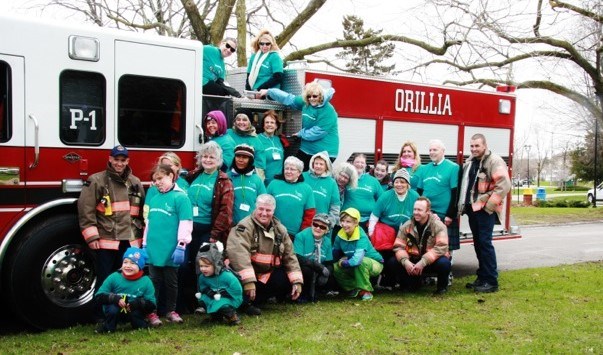The Hike for Hospice, a nationwide event held in cities from coast to coast, will kick off at Couchiching Beach Park in Orillia May 6.
The walk is the largest fundraiser of the year for Hospice Orillia, says the agency's community engagement lead, Amy Pritzker.
“On average, we get about 100 people out to the hike and our fundraising goal this year is $25,000,” she said.
Last year’s event raised almost $27,000 she noted, adding people were inspired to get involved and get behind plans for a new hospice for the area: The Mariposa House Hospice.
Proceeds from this year’s walk will once again be split between the new hospice and Hospice Orillia services.
“People in Orillia are really energetic about having a facility and being involved in a grass-roots campaign,” said Pritzker, noting the two groups work together. “I really see the value of having a facility – a hospice is something that is really needed. However, we don’t want to forget about the bulk of services available along the continuum of care in what, for many people, can be a long process.”
That’s the other value of the walk: to raise awareness about the programs and services of Hospice Orillia. She said many people refuse to plan for the reality of death and “have no concept about what hospice palliative care is.”
She said many people think “it means only imminent death services available right at the end of life. People miss out on the spectrum of support they can access along this journey,” she said, noting that, for many, they need the most help at the time of diagnosis.
“We infuse the whole journey with hope,” said Pritzker. “It’s just not necessarily adding days to your life, it’s addling life to your days. We hope for the best, we hope for a cure, but we also work on a Plan B.”
She said some people are “so fixated on getting cured, they miss out on everything else in the final part of that journey because they don’t want people to think they gave up. Some people are missing out on the concept of what does it mean to end well. We’re all going to die.”
Experienced and compassionate staff can help during the journey. They can assist families as they navigate the health-care system, access hospice supports and help people have important conversations with their “substitute decision makers.”
She said a recent study showed that 70% of the population is “health illiterate.” With that in mind, “we want to make sure people have some knowledge about the system so they can navigate it. Navigating it when you’re in crisis is horrible – that’s what hospice can help with.”
Hospice Orillia also offers a visiting volunteer program which is “a day program for those experiencing life-limiting illness so they can have support around their own anticipatory grief. A lot of people don’t want to share what they’re going through with their loved ones because they are already grieving.”
She said complimentary therapies such as massage therapy, acupuncture and reiki can also be accessed through Hospice Orillia in addition to caregiver relief. She also acknowledged people aren’t suffering just physically.
“People also go through emotional and spiritual struggles and there might be unfinished business in a person’s life, so we encourage life reflection,” said Pritzker. “We try to put the emphasis on the person – not the diagnosis or the disease. It’s about human-to-human care and emphasizing that people are living until the moment they die.”
Pritzker understands death and dying can be difficult to contemplate; It’s why their role is so important, she said. “I have often had people say, ‘No one told me this existed’ and ‘Had I known, it would have made a world of difference.’”
She said much effort and emphasis is, rightly, placed on the importance of a hospice, a physical space where someone can die with dignity.
“However, the average length of stay in a residential hospice is two weeks, so for many people, when they need the support is actually along that continuum and under the umbrella of services,” she said. “All those services, a residential component and, ideally, bereavement support programs after they lose a loved one are what’s needed.”
For more information about the local Hike for Hospice, visit hospiceorillia.ca or contact Pritzker at 705-325-0505, ext. 109 or via email: [email protected]
